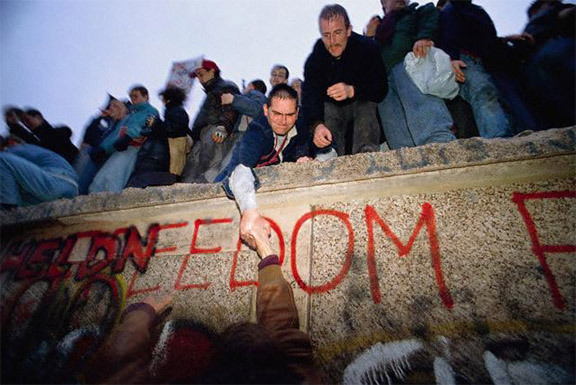
2009 is a special year for anniversaries. We celebrate the 20th anniversary of the fall of the Berlin Wall on November 9, 1989. Inextricably linked to this, we also celebrate the 60th anniversary of the founding of the Federal Republic of Germany on May 23, 1949, and of NATO on April 4, 1949.
The Berlin Wall had not only torn families apart for 28 years but had in fact also divided a city and a country into two parts. The Wall was also the very symbol of the Cold War. It stood for the division of the world into a “free” and an “unfree” part. The Wall eventually fell absolutely peacefully, without a shot being fired, without blood being shed. It was like a miracle. The peaceful protests of the people in the GDR had been building up for months and eventually became unstoppable. The GDR state in which injustice had prevailed collapsed in 1989/90, not least due to the people’s hunger for freedom.
After the fall of the Wall, less than a year passed before we achieved the reunification of Germany, in peace and freedom, with God’s help and with the approval of our partners and allies in the world. On October 3, 1990, we celebrated the Day of German Unity. It was the triumph of freedom. At the same time, it was final confirmation of Chancellor Adenauer’s policy of aligning the Federal Republic to the West under the proviso of ultimate reunification, a goal we resolutely pursued over the years. When reunification came into reach in 1989/90, it was abundantly clear to me, as it had been to Konrad Adenauer in the early years of our young democracy, that a reunited Germany had to be a member of NATO. Reunification with the price tag of Germany leaving NATO would not have been possible with me. Our partners and neighbors were well aware of this.
The crucial allies on this journey were for us the Americans and President George Bush. My friend George Bush was a godsend for us Germans and for me personally. We trusted each other and shared the same fundamental belief in freedom. Although quite different on the German question, the situation regarding trust was very similar with Mikhail Gorbachev.
Well aware of the steadfastness of the West, which was particularly evident in NATO’s Double-Track Decision, Mikhail Gorbachev set the course for the opening of the Eastern bloc with glasnost and perestroika and followed a peaceful route, displaying great courage throughout the whole process.
The years 1989/90 have changed the world. We should never forget that everything could have turned out very differently. That is why the 20th anniversary of the fall of the Wall is above all a day of great joy and thanksgiving for the free world from which we can draw motivation and commitment for the future.
Dr. Helmut Kohl was chancellor of West Germany from 1982 to 1990 and of the reunified German nation from 1990 to 1998. This piece is selected from Freedom’s Challenge, an Atlantic Council publication commemorating the 20th anniversary of the fall of the Berlin Wall.
Image: Berlin%20Wall%20Freedom_0.jpg
